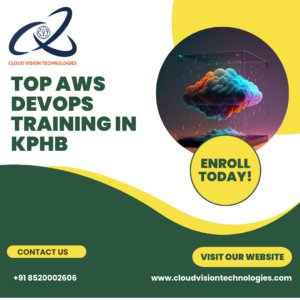Introduction
In the fast-paced world of software development, businesses need efficient processes to build, test, and deploy applications seamlessly. Traditional software development models often struggle with slow-release cycles, lack of automation, and communication gaps between development and operations teams. This is where DevOps comes in—a revolutionary approach that integrates development (Dev) and operations (Ops) to streamline workflows, improve efficiency, and foster collaboration. Cloud Vision Technologies – AWS DevOps Course in KPHB.
DevOps practices focus on automation, continuous integration, continuous delivery, monitoring, and infrastructure management, ensuring that businesses can quickly adapt to changes, reduce deployment failures, and enhance software reliability. Amazon Web Services (AWS) provides a powerful suite of DevOps tools and services that enable organizations to automate workflows, manage infrastructure as code (IaC), and ensure high availability, security, and scalability. AWS DevOps Course in KPHB.

What is AWS DevOps?
AWS DevOps is the implementation of DevOps principles using AWS cloud services, allowing organizations to automate the software development lifecycle, streamline infrastructure provisioning, and improve system monitoring. AWS offers a range of tools that help teams manage the entire DevOps pipeline, from Continuous Integration (CI) and Continuous Deployment (CD) to security and compliance monitoring. AWS DevOps Course in KPHB.
With AWS DevOps, organizations can:
- Automate Code Integration & Deployment: AWS provides services like AWS CodePipeline, AWS CodeBuild, AWS CodeDeploy, and AWS CodeCommit to automate software delivery pipelines and ensure smooth deployments.
- Manage Infrastructure as Code (IaC): Tools such as AWS CloudFormation and AWS CDK help define and manage cloud infrastructure through code, ensuring consistency and repeatability.
- Enhance Monitoring & Logging: AWS offers Amazon CloudWatch, AWS X-Ray, and AWS CloudTrail for real-time monitoring, performance optimization, and security auditing. AWS DevOps Course in KPHB
- Leverage Containerization & Orchestration: AWS supports Docker, Kubernetes, and serverless computing through services like Amazon ECS, Amazon EKS, and AWS Fargate, simplifying application deployment and scaling.
- Ensure Security & Compliance: AWS security services like IAM (Identity and Access Management), AWS Secrets Manager, and AWS Config enable fine-grained access control, data encryption, and regulatory compliance. AWS DevOps helps organizations eliminate manual processes, increase operational efficiency, and accelerate software releases, making it an ideal choice for companies adopting cloud-native development practices.
Key Components of AWS DevOps
Continuous Integration and Continuous Deployment (CI/CD):
Continuous Integration (CI) and Continuous Deployment (CD) are fundamental to DevOps, ensuring that code changes are integrated, tested, and deployed efficiently. These practices help organizations reduce deployment time, detect errors early, and maintain high-quality software releases. AWS provides several tools to streamline CI/CD pipelines:
AWS CodePipeline automates the entire software release process, from building to deployment, ensuring faster and more reliable application updates. By integrating various AWS and third-party tools, CodePipeline enables teams to manage complex workflows with minimal manual intervention. AWS DevOps Course in KPHB
AWS CodeBuild compiles source code, runs automated tests, and produces deployable artifacts, eliminating the need for dedicated build servers. It provides scalable and cost-effective build environments, ensuring continuous testing and rapid feedback loops for developers. AWS DevOps Course in KPHB.
AWS CodeDeploy simplifies software deployments by automating the distribution of applications across Amazon EC2 instances, AWS Lambda, and other environments. By reducing downtime and minimizing deployment errors, CodeDeploy ensures that new software updates reach end-users efficiently. AWS DevOps Course in KPHB
AWS CodeCommit serves as a fully managed source control service that securely stores and manages Git repositories. It facilitates version control, supports team collaboration, and integrates seamlessly with other AWS DevOps services. By leveraging these services, organizations can achieve rapid software delivery, maintain code integrity, and reduce deployment risks, ultimately improving the overall development lifecycle.
Infrastructure as Code (IaC)
Infrastructure as Code (IaC) allows developers to define and manage infrastructure through code, ensuring consistency, scalability, and repeatability. By automating infrastructure provisioning, IaC eliminates the need for manual configuration, reducing errors and improving efficiency. AWS DevOps Course in KPHB
AWS CloudFormation enables users to define AWS infrastructure in JSON or YAML templates, automating provisioning and managing dependencies between resources. With CloudFormation, teams can create, update, and delete entire application environments in a predictable and repeatable manner. AWS DevOps Course in KPHB
AWS CDK (Cloud Development Kit) provides a higher-level programming approach for defining cloud resources using familiar programming languages like Python, TypeScript, and JavaScript. CDK makes it easier for developers to manage infrastructure as code by leveraging modern programming constructs. AWS DevOps Course in KPHB
Terraform (a popular third-party tool) is widely used for declaratively managing infrastructure across AWS and multi-cloud environments. Organizations that require flexibility and interoperability often choose Terraform due to its modular approach and extensive provider support. Implementing IaC ensures faster deployments, reduces manual errors, and enhances infrastructure scalability across different environments. It also promotes version-controlled infrastructure, allowing teams to track changes and maintain consistency.

Monitoring and Logging:
Effective monitoring and logging are essential for maintaining application performance, detecting issues, and improving system reliability. AWS offers several services for real-time monitoring and logging, allowing businesses to gain insights into application health and optimize resource usage. AWS DevOps Course in KPHB
Amazon CloudWatch collects and tracks performance metrics, monitors log files, and sets alarms to trigger automated responses to system changes. It provides detailed visibility into resource utilization, helping teams troubleshoot issues and optimize workloads.
AWS X-Ray helps developers analyze and debug distributed applications by visualizing service maps and tracking application requests across various components. With X-Ray, teams can identify latency issues, bottlenecks, and errors in microservices-based architectures. AWS DevOps Course in KPHB
AWS CloudTrail provides auditing and governance by logging API calls, helping organizations maintain compliance and security visibility. It records changes to AWS resources, allowing administrators to track user activities and detect unauthorized access attempts. By integrating these monitoring tools, businesses can proactively identify performance bottlenecks, optimize resources, and improve user experience. Continuous monitoring also enhances security by detecting anomalies and preventing potential threats.
Containerization and Orchestration:
Containerization has revolutionized software deployment, enabling applications to run consistently across different environments. Containers encapsulate applications and their dependencies, ensuring portability and reducing compatibility issues. AWS offers robust services for container management and orchestration:
Amazon ECS (Elastic Container Service) simplifies the management and scaling of Docker containers, ensuring high availability and efficient resource utilization. ECS integrates with AWS Fargate, allowing developers to run containers without managing underlying infrastructure. AWS DevOps Course in KPHB
Amazon EKS (Elastic Kubernetes Service) provides a managed Kubernetes environment, allowing organizations to run and orchestrate containerized applications seamlessly. EKS simplifies Kubernetes deployment, making it easier to scale applications and manage workloads. AWS DevOps Course in KPHB
AWS Fargate is a serverless compute engine that eliminates the need to provision and manage servers. With Fargate, developers can focus solely on application development while AWS handles infrastructure management, scaling, and maintenance. With these services, organizations can deploy applications faster, scale efficiently, and reduce operational overhead while leveraging the benefits of microservices architecture. Containers enable agility, allowing teams to build, test, and deploy applications rapidly.
Security and Compliance:
Security is a top priority in DevOps, and AWS offers a range of services to enforce compliance, protect sensitive data, and manage access controls. Implementing security best practices ensures that applications remain protected against threats and meet regulatory requirements. AWS DevOps Course in KPHB
AWS IAM (Identity and Access Management) allows organizations to define granular permissions, ensuring that only authorized users and services can access AWS resources. IAM roles and policies provide fine-grained access control, minimizing security risks.
AWS Secrets Manager securely stores and manages sensitive data, such as API keys, passwords, and database credentials. By automating secret rotation and access control, Secrets Manager helps prevent unauthorized access and data breaches.
AWS Config continuously tracks AWS resource configurations, providing visibility into compliance status and detecting configuration drift. Organizations can use AWS Config rules to enforce security policies and maintain best practices. By incorporating these security best practices, organizations can strengthen their DevOps workflows, safeguard data, and meet regulatory compliance requirements. Automating security enforcement ensures that applications remain secure without slowing down development cycles.
Why Choose AWS DevOps?
AWS DevOps is a preferred choice for organizations looking to streamline software development, deployment, and operations. Here’s why AWS DevOps stands out:
Comprehensive Toolset
AWS provides a wide range of DevOps tools that seamlessly integrate to create efficient CI/CD pipelines. Services like AWS CodePipeline, AWS CodeBuild, AWS CodeDeploy, and AWS CodeCommit automate the software release process, ensuring smooth and rapid deployments. These tools help developers focus on writing code while minimizing deployment errors and manual intervention. AWS DevOps Course in KPHB
Scalability & Flexibility
AWS allows businesses to scale their infrastructure dynamically based on demand. Amazon EC2 Auto Scaling automatically adjusts the number of instances to handle traffic spikes, ensuring high availability. AWS Lambda enables event-driven, serverless computing, allowing applications to scale instantly without provisioning servers. Additionally, AWS Elastic Load Balancing (ELB) distributes incoming traffic across multiple instances, preventing overloading and ensuring consistent performance. AWS DevOps Course in KPHB.
Security & Compliance
Security is a top priority in any DevOps pipeline. AWS provides robust security mechanisms such as AWS IAM (Identity and Access Management) for fine-grained access control, AWS Secrets Manager for secure credential storage, and AWS Config for compliance tracking and policy enforcement. These tools ensure that sensitive data is protected and that organizations meet industry regulatory standards like GDPR, HIPAA, and SOC 2.
Infrastructure as Code (IaC) Support
AWS supports Infrastructure as Code (IaC), enabling developers to automate infrastructure provisioning and management. AWS CloudFormation allows infrastructure to be defined using JSON or YAML templates, ensuring repeatability and consistency. AWS CDK (Cloud Development Kit) provides a higher-level programming approach for defining cloud resources using languages like Python and TypeScript. Additionally, AWS integrates with Terraform, a widely used third-party IaC tool, offering multi-cloud deployment capabilities.
Cost Efficiency
AWS follows a pay-as-you-go pricing model, ensuring that businesses only pay for the resources they use. AWS Spot Instances allow companies to run workloads at a significantly lower cost by utilizing unused AWS capacity. AWS Savings Plans provide predictable pricing with long-term usage commitments, helping organizations optimize their cloud spending while maintaining operational efficiency. AWS DevOps Course in KPHB
Monitoring & Automation
Effective monitoring and automation are critical for maintaining application health and optimizing performance. Amazon CloudWatch tracks system metrics, logs, and sets up alerts for automated responses. AWS X-Ray helps visualize and debug distributed applications, ensuring seamless performance. AWS CloudTrail provides auditing and governance by logging API activity across AWS accounts, helping organizations maintain security and operational transparency. AWS DevOps Course in KPHB.
Seamless Container & Serverless Support
AWS simplifies containerized application deployment with Amazon ECS (Elastic Container Service) for Docker container management, Amazon EKS (Elastic Kubernetes Service) for Kubernetes orchestration, and AWS Fargate for serverless container execution. These services eliminate the need for manual infrastructure management, allowing organizations to deploy and scale containerized applications effortlessly. Additionally, AWS Lambda provides a fully managed, event-driven computing model that reduces infrastructure overhead while delivering high availability and scalability. AWS DevOps Course in KPHB.
Global Reach & High Availability
With multiple AWS regions and availability zones (AZs), organizations can deploy applications closer to their users, reducing latency and improving performance. AWS’s global infrastructure ensures fault tolerance, disaster recovery, and redundancy, minimizing the risk of service disruptions. By leveraging AWS’s content delivery network, Amazon CloudFront, businesses can further enhance application responsiveness and deliver content seamlessly across the globe. AWS DevOps Course in KPHB.

Benefits of AWS DevOps:
Faster Delivery
Automated CI/CD pipelines streamline software delivery by reducing manual intervention and enabling continuous integration and deployment. This ensures that updates reach production faster, reducing time-to-market and enhancing agility in application development.
Scalability
AWS allows organizations to dynamically scale resources based on application demand. Whether handling sudden traffic spikes or scaling down during off-peak hours, AWS Auto Scaling and Elastic Load Balancing ensure optimal performance and cost efficiency.
Cost Efficiency
With AWS’s pay-as-you-go pricing model, businesses can eliminate upfront infrastructure costs and only pay for what they use. This reduces waste and helps organizations optimize cloud spending based on actual requirements. AWS DevOps Course in KPHB.
Enhanced Security
AWS DevOps integrates security best practices through IAM, Secrets Manager, and automated compliance checks. By enforcing security policies and continuously monitoring environments, organizations can mitigate risks and ensure regulatory compliance.
Improved Collaboration
DevOps fosters better communication between development and operations teams by breaking silos and promoting shared responsibility. AWS tools like CodeCommit and CloudFormation enable seamless collaboration, improving workflow efficiency and team productivity. AWS DevOps Course in KPHB.
Best Practices for AWS DevOps Implementation:
Adopt Infrastructure as Code (IaC)
Implementing Infrastructure as Code (IaC) allows teams to automate resource provisioning, ensuring consistency and reducing manual errors. By using tools like AWS CloudFormation and AWS CDK, organizations can define infrastructure in code, making it easier to version, replicate, and scale cloud resources. AWS DevOps Course in KPHB.
Implement CI/CD Pipelines
Continuous Integration and Continuous Deployment (CI/CD) pipelines streamline application development and deployment. Automating the build, test, and deployment processes with AWS CodePipeline and CodeBuild reduces human intervention, speeds up releases, and ensures consistent software quality. AWS DevOps Course in KPHB.
Leverage Monitoring Tools
Monitoring and logging are crucial for identifying and addressing performance issues. AWS CloudWatch and AWS X-Ray provide real-time insights into application health, enabling teams to detect anomalies, troubleshoot failures, and optimize resource utilization efficiently.
Use Containers and Orchestration
Containerization ensures application portability and scalability. By leveraging Amazon ECS, Amazon EKS, and AWS Fargate, organizations can simplify deployment, scale efficiently, and enhance fault tolerance, improving the overall application lifecycle.
Prioritize Security
Security must be embedded in every phase of DevOps. Enforcing IAM policies, using AWS Secrets Manager for credential management, and continuously auditing logs with AWS CloudTrail helps organizations maintain compliance and safeguard sensitive data from threats. AWS DevOps Course in KPHB.
Embrace Automation
Automation is the backbone of DevOps. Using AWS Lambda, AWS Step Functions, and automated patch management tools reduces manual effort, minimizes errors, and accelerates software delivery while maintaining operational efficiency.
AWS DevOps Course in KPHB:
Cloud Vision Technologies, located in KPHB, Hyderabad, offers a comprehensive AWS DevOps course designed to equip professionals with in-depth knowledge of AWS services and DevOps practices. The curriculum emphasizes hands-on learning, allowing students to work on real-world projects that simulate industry scenarios. With flexible scheduling options, including weekend and evening batches, the course caters to both working professionals and full-time students. Upon completion, participants are well-prepared for roles such as AWS DevOps Engineer, Cloud Engineer, and DevOps Consultant.

Conclusion
AWS DevOps combines the power of AWS cloud computing with DevOps methodologies to streamline application development and deployment. By leveraging AWS’s robust set of DevOps tools, businesses can automate processes, improve collaboration, and achieve higher efficiency. Whether you are a startup or an enterprise, adopting AWS DevOps can significantly enhance your software delivery pipeline and drive innovation. AWS DevOps Course in KPHB.
AWS DevOps transforms software development by automating processes, improving collaboration, and optimizing cloud operations. By leveraging AWS’s powerful tools, organizations can enhance agility, security, and efficiency, driving innovation in the digital era. AWS DevOps Course in KPHB.
Address: Cloud Vision Technologies
Location: Samhitha Enclave, 3rd floor, KPHB Phase 9, Kukatpally, Hyderabad, Telangana – 500072
Contact Number : +91 8520002606
Mail ID: info@cloudvisiontechnologies.com
Website: https://cloudvisiontechnologies.com




